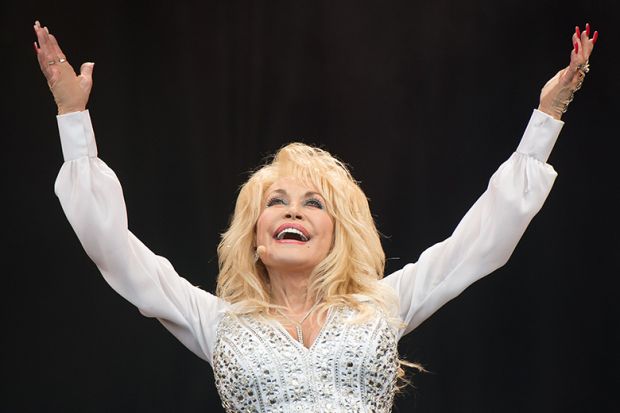Vanderbilt University’s Naji Abumrad aided the development of a coronavirus vaccine by listening closely to one of his patients. Universities studying the encounter might help scientists thwart the next pandemic even faster.
The patient was country music legend Dolly Parton, who struck up a hospital-room friendship with Professor Abumrad, learned from him about Covid, and then made a $1 million (£750,000) research donation at a crucial early moment.
One crucial lesson, Professor Abumrad told Times Higher Education, was that universities should not underestimate the importance of communicating science to non-experts in both their institutional operations and their curricula.
“No matter how much they’re doing, they can do more,” the professor of surgery said of universities. “I don’t know what the litmus test is going to be, where the bar is going to be set, but that bar needs to be moved upward every single time.”
Professor Abumrad was thrust into the public spotlight when the biotech company Moderna announced that its experimental vaccine appeared to be 95 per cent effective against Covid, and media reports highlighted Ms Parton’s role in financing its critical initial development work at Vanderbilt.
The story starts in 2013, when Ms Parton came to the Vanderbilt University Medical Center in Nashville for examination of a minor injury after a car crash. Professor Abumrad, a native of Lebanon, knew little of the incomparable singer-songwriter-actor, but the pair found a kinship in the similarity of their hardscrabble mid-century childhoods on opposite sides of the planet.
Both had hard-working parents who scraped by with little formal education, Professor Abumrad said. The parallels in their upbringings even extended to small houses on the sides of hills above poor villages. “The families were interchangeable, almost identical,” he said.
“An incredibly nice person,” Professor Abumrad said of a seven-year friendship that gained little fanfare even among close family members. “I mean, [a] very, very smart lady, very nice, very down to earth human being.” Their years of wide-ranging conversations included, earlier this year, his explanations of coronavirus-related research at Vanderbilt.
The global superstar absorbed the message, then made the donation without even telling him. “I didn’t know about it until it hit the news,” he said.
The money aided at least three different Covid-related efforts at Vanderbilt, Professor Abumrad said, including vastly accelerating work led by Mark Denison – the director of the division of infectious diseases in Vanderbilt’s medical school – that fed into the Moderna vaccine.
The Denison lab deals with diseases so dangerous that otherwise simple tasks become major processes, Professor Abumrad said. “If your nose itches, you cannot touch it,” he said. “Everything has to come to a halt.”
In that ultra-demanding environment, he said, Ms Parton’s donation helped the lab compress about 10 months of vaccine development into less than two.
The Moderna vaccine and at least two other drug candidates also racing towards regulatory approval are now driving hopes that a pandemic responsible for nearly 1.5 million deaths worldwide could be brought under control within just a few more months.
Yet the blossoming optimism comes with the tough recognition, especially in the US, that the carnage could have been much less severe had policymakers and scientists found better ways to deliver and reinforce credible messages of the public behaviours known to slow the spread of Covid.
That tragic reality, Professor Abumrad noted, helps to point out the enduring need for better communications skills among scientists and the universities who train them.
Part of it, Professor Abumrad acknowledged, is teaching doctors to speak directly to patients in ways that convey the respect and trust he demonstrated with Ms Parton. And part of it, Professor Abumrad admitted, involves more modern skills with social media, which he recognises he lacks.
Universities must adopt both top-level communications operations that speak in ways the public can understand and accept, and classroom strategies that build those abilities into their graduates, he said.
Many universities do well in those areas, but all must keep improving, Professor Abumrad said. “It’s going to help us during periods of pandemics,” he said. “As we noticed this time.”
POSTSCRIPT:
Print headline: Parton gift: Dolly’s donation shows outreach pays
Register to continue
Why register?
- Registration is free and only takes a moment
- Once registered, you can read 3 articles a month
- Sign up for our newsletter
Subscribe
Or subscribe for unlimited access to:
- Unlimited access to news, views, insights & reviews
- Digital editions
- Digital access to THE’s university and college rankings analysis
Already registered or a current subscriber? Login









